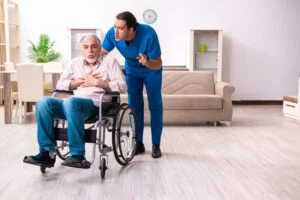
You can sue a nursing home for abuse if you have a reason to believe a nursing home employee or a facility’s negligent practice is abusing, neglecting, or exploiting your loved one. If this is the case, you could sue the nursing home for medical malpractice or personal injury for the following:
- Negligent hiring or supervision
- Neglecting a resident
- Unclean or unsanitary environment
- Unsafe environment
- Inadequate medical treatment
To begin this process, you, a doctor, or a legal representative must report concerns of abuse to your county office of the Ohio Department of Job and Family Services (ODJFS), which will then determine if your loved one needs protective services.
Potential Outcomes and Compensation of Suing for Nursing Home Abuse
If you decide to file a lawsuit over the abuse of your loved one at a nursing home, you could experience several outcomes, including:
Monetary Compensation
If you win the court case, you will likely receive monetary compensation for economic and non-economic damages. Economic compensation is for any financial loss, and non-economic compensation is for any mental or physical injuries or other non-monetary losses. Monetary damages you could receive include:
- Medical care costs (past, ongoing, and future)
- Rehabilitative services
- Custodial care
- Loss of earnings or earning ability
- Physical pain
- Mental and emotional suffering
- Permanent impairment or function loss
A court could compensate you for past damages and potential future losses it believes are directly related to the abuse that took place at the nursing home.
The Benefits of Hiring a Lawyer
Working with a lawyer ensures that you have a legal professional protecting your rights and looking out for you and your loved one’s interests as they work on your case. They will know how to build your case and meticulously comb through relevant paperwork and collect evidence that supports your account of events.
It is likely a lawyer will find evidence that you may have missed on your own. Lawyers spend years studying the law and know what evidence is needed to make your case. A nursing home will likely have legal professionals representing them, so you likely will need to do the same. You don’t want to go to court without thoroughly understanding the law and the damages you are suing for.
An attorney will also keep your case on track and ensure you meet all legal deadlines to protect your right to hold the liable party accountable.
The Cost of Hiring a Lawyer
Many personal injury lawyers or law firms offer a free consultation. During this consultation, a lawyer can assess if you legally have a case against a nursing home you suspect is abusing a relative. Some lawyers charge hourly, and some charge a percentage of the potential settlement.
If your attorney works on contingency, they won’t collect payment from you unless they recover financial compensation for you. This payment is an agreed-upon percentage of your settlement, so you should ask your attorney questions and understand how the agreement works before approving it.
Determining if Your Elder Relative Is Being Abused
According to an article from Elder Mistreatment: Abuse, Neglect, and Exploitation in an Aging America, most elders in nursing homes who experience abuse either can’t or feel afraid to report it because they depend on the staff for food, medication, and daily care. Being aware of the types of abuse that your loved ones may be enduring and taking legal action to protect them could save their lives.
Legal Definition of Elder Abuse
The Ohio Revised Code Section 5101.60 refers to elder abuse as imposing injury through unnecessary confinement, harmful punishment, or intimidation that results in physical or mental harm. Elder abuse often includes exploitation and neglect of the patient. These can be defined as:
- Neglect: The failure to provide services that protect and care for your loved one’s mental and physical health. This could look like a lack of cleanliness, nutrition, or medical aid.
- Exploitation: Using an adult or the adult’s resources for profit or personal gain. This could involve a nursing staff member coercing your loved one to sign a document or cashing checks in your loved one’s name without their permission.
Types of elder abuse can include:
- Physical abuse
- Verbal abuse
- Emotional abuse
- Sexual abuse
- Financial abuse
Abuse can come in many forms. Recognizing the signs of abuse is only the first step to getting your loved one the help they need. The next step is to take legal action.
The Fitch Law Firm LLC Can Help With Your Nursing Home Abuse Case
Suing for elder abuse can be a tiresome and lengthy process. The Fitch Law Firm LLC can take the legal workload off you so you can focus on caring for your loved one instead of worrying about filing reports.
You can personally sue a nursing home for your loved one’s abuse, and we can help you. Call us today for a review of your legal options during a free consultation.
